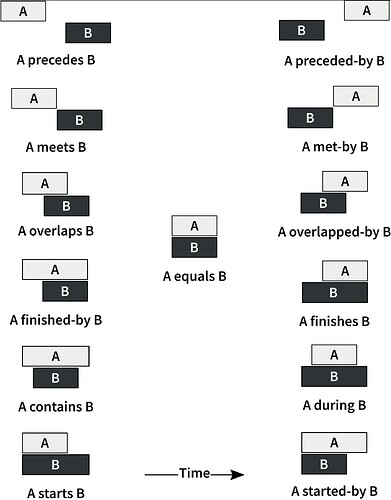Continuing the discussion from Different note durations not in sync:
Jumping off from a conversation on syncing events, I’ve been wondering if anyone here has dabbled with applying Interval Algebra for event scheduling, either in SuperCollider or elsewhere. I’m curious about your experiences and any insights about it.
In SuperCollider, event timing is intricately managed through patterns. This neat setup keeps our event timings tight, arranging when and for how long each event plays. They can be extended with synchronization across different sequences or voices (earlier discussions), although not a trivial case in this system.
In SC, generating Non-Real-Time (NRT) scores or using constraint-based rules in real-time, exploring different concepts of time is not as developed as Patterns.
Something I think about sometimes is how a pattern-based approach to timing is conceptually different from the qualitative relationships between time intervals, which is a less precise and focus on a more intuitive logic.
Imagine a scenario involving three distinct musical events—A, B, and C—each with unique temporal relationships:
-
Event A serves as the reference event, spreading throughout a bar.
-
Event B begins after the start of Event A and ends before Event A’s termination, illustrating
A during Brelationship. -
Event C begins towards the end of Event B and concludes concurrently with Event A, representing an interplay where
B overlaps Cand simultaneously,C finishes A.
This is where something like Allen’s Interval Algebra could be relevant (at least as a reference), considering events “from the other side”. It’s like examining the whole story of how events “meet,” overlap, or follow each other.
Basic relations look like this:
More interesting than the relations between two events, would be a model of a network of intervals ( an IntervalGraph). It could calculate or adapt the timing of events to meet the determined relationships, where each event relates with the others. This could be a tool for analysis, or rules for generating events.
References:
